| The Nation’s Road Capacity:
How Fast is it Growing? |
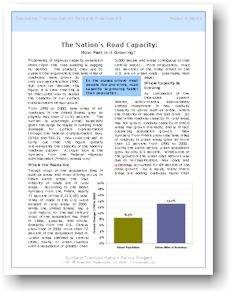 Highway interests often back up their calls for
more road-building by citing the statistic that roadway
capacity in the U.S. has grown by just 2 percent in the last
ten years. A new edition of STPP’s “Decoding Transportation
Policy & Practice” explains why that figure greatly
misrepresents the capacity of our nation's surface
transportation infrastructure. Highway interests often back up their calls for
more road-building by citing the statistic that roadway
capacity in the U.S. has grown by just 2 percent in the last
ten years. A new edition of STPP’s “Decoding Transportation
Policy & Practice” explains why that figure greatly
misrepresents the capacity of our nation's surface
transportation infrastructure.
STPP's analysis of data from the
Federal Highway Administration and the U.S. Census shows that
while overall road capacity has grown only slightly, in
built-up areas -- where the vast majority of people live and
drive -- capacity has increased by more than 13 percent. This
growth reflects a shift in investment priorities coinciding
with the completion of the Interstate system and is outpacing
population growth.
To view the decoder, click here (.pdf format).
|
| Hill News |
Transit Successes Touted Before
House Panel
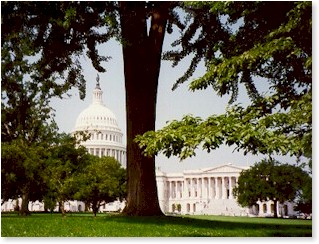 TEA-21's guaranteed funding levels for public
transit investments have provided a significant increase in
economic and social benefits, according to transit leaders who
testified before the House Subcommittee on Highways and
Transit subcommittee today. TEA-21's guaranteed funding levels for public
transit investments have provided a significant increase in
economic and social benefits, according to transit leaders who
testified before the House Subcommittee on Highways and
Transit subcommittee today.
FTA Administrator Jenna Dorn at the
April 17th hearing told the panel members, “public
transportation benefits people who choose to ride it, and
benefits those who have no choice; even people who choose not
to ride public transportation benefit from the more vibrant,
healthy community that it fosters.”
In his testimony, American Public
Transportation Association President William Millar stated,
“We appreciated what the legislation and its reliable and
predictable annual funding has meant for our industry and the
millions of Americans who rely on our services. Whether it’s
expanded personal mobility choices or a myriad economic and
commercial returns or cleaner air, all Americans receive the
benefits of public transportation investment.”
For more information, click
here.
Welfare Reauthorization Gains
Speed in House Ways and Means Committee
In other Hill news, the full House
Ways and Means Committee, which has principal jurisdiction
over federal welfare legislation, is expected to mark up the
subcommittee bill to reauthorize the Temporary Assistance for
Needy Families (TANF) program as early as this week. Similar
to the Administration's proposal, the Personal Responsibility,
Work and Family Promotion Act of 2002 (HR 4090) would require
a doubling of participants in work activities despite an
absence of new funding beyond the annual $16.5 billion in
block grants for cash assistance and work supports provided in
the 1996 welfare reform law.
Although states spent more than
$532 million on transportation services for welfare recipients
and low income workers (from TANF and other federal and state
funds in FY2000), so far the pending House bills do not
directly address transportation needs. In response to greater
unemployment, some states have begun shifting TANF funds,
which have often been used to match FTA Job Access and Reverse
Commute grants, from work supports to cash assistance
payments. According to Hill insiders, legislation to be
introduced in the Senate next month may seek to secure work
participation credits or new funding for transportation,
childcare, education and other work supports.
For a New York Times article
on state views on TANF reauthorization, click
here.
Committee Favorably Reports
National Defense Interstate Rail Act
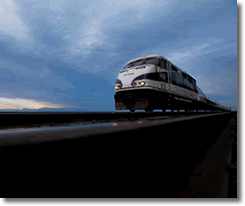 The Senate Committee on Commerce, Science, and
Transportation voted 20-3 in favor of the National Defense
Interstate Rail Act (S. 1991) on April 18, 2002. The bill,
authored by the Committee Chair Fritz Hollings (SC) and other
Senate leaders, calls for a broader federal commitment to
developing interstate rail infrastructure, focusing on
high-speed rail corridors, increased funding and fiscal
accountability for Amtrak, and new security requirements for
rail lines and stations. To read more about this bill, click
here. The Senate Committee on Commerce, Science, and
Transportation voted 20-3 in favor of the National Defense
Interstate Rail Act (S. 1991) on April 18, 2002. The bill,
authored by the Committee Chair Fritz Hollings (SC) and other
Senate leaders, calls for a broader federal commitment to
developing interstate rail infrastructure, focusing on
high-speed rail corridors, increased funding and fiscal
accountability for Amtrak, and new security requirements for
rail lines and stations. To read more about this bill, click
here.
House Committee Continues
Streamlining Efforts
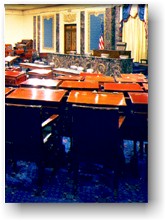 The House Committee on Transportation
and Infrastructure approved an airport ‘streamlining’ bill, HR
4481, last week that would threatens the environmental review
process for airport siting and infrastructure projects. The
aviation streamlining bill is viewed as part of a concerted
progression of attacks on existing federal environmental
statutes. Proponents of aviation and other environmental
streamlining efforts argue that existing environmental review
and regulations are hindering transportation and other
improvement projects. Environmental and other groups opposed
the pending aviation bill, which was somewhat modified in the
full committee, expressing concerns that the issues
surrounding large, complicated and controversial projects are
not simply explained by attacks on the underlying federal
environmental statutes. In addition, streamlining efforts in
aviation and in other areas are expected to undermine state
and local efforts to participate in projects that directly
affect them and that some proposed “reforms” could have
disastrous environmental repercussions. For more information,
click
here. The House Committee on Transportation
and Infrastructure approved an airport ‘streamlining’ bill, HR
4481, last week that would threatens the environmental review
process for airport siting and infrastructure projects. The
aviation streamlining bill is viewed as part of a concerted
progression of attacks on existing federal environmental
statutes. Proponents of aviation and other environmental
streamlining efforts argue that existing environmental review
and regulations are hindering transportation and other
improvement projects. Environmental and other groups opposed
the pending aviation bill, which was somewhat modified in the
full committee, expressing concerns that the issues
surrounding large, complicated and controversial projects are
not simply explained by attacks on the underlying federal
environmental statutes. In addition, streamlining efforts in
aviation and in other areas are expected to undermine state
and local efforts to participate in projects that directly
affect them and that some proposed “reforms” could have
disastrous environmental repercussions. For more information,
click
here.
|
| New NHTSA Highway
Statistics Released |
|
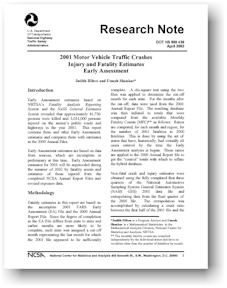 Newly released statistics from the National Highway
Traffic Safety Administration (NHTSA) show a slight decline in
the number of traffic fatalities and injuries from 2000 to
2001. Injuries from crashes fell 5 percent from 3.2 million in
2000 to 3.0 million in 2001. A total of 41,730 people were
killed in crashes last year, a drop of two-tenths of one
percent from the 41,821 persons killed in 2000. "Losing nearly
42,000 of our friends, neighbors and family members to highway
crashes is unacceptable," said U.S. Transportation Secretary
Norman Y. Mineta in response to the new statistics. Since
1990, more than 450,000 Americans have died in crashes. Newly released statistics from the National Highway
Traffic Safety Administration (NHTSA) show a slight decline in
the number of traffic fatalities and injuries from 2000 to
2001. Injuries from crashes fell 5 percent from 3.2 million in
2000 to 3.0 million in 2001. A total of 41,730 people were
killed in crashes last year, a drop of two-tenths of one
percent from the 41,821 persons killed in 2000. "Losing nearly
42,000 of our friends, neighbors and family members to highway
crashes is unacceptable," said U.S. Transportation Secretary
Norman Y. Mineta in response to the new statistics. Since
1990, more than 450,000 Americans have died in crashes.
Pedestrian fatalities declined
slightly from 2000 to 2001. 4,698 pedestrians were killed in
traffic crashes in 2001, a drop of 0.9 percent from 2000.
Cyclist deaths grew to more than 700 in 2001, an increase of
1.6 percent over the number of cyclists killed in crashes with
vehicles in 2000.
For more information, visit the NHTSA website.
|
| New VMT Figures
Released |
|
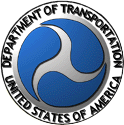 Figures from FHWA and the American Public Transit
Association released April 17, 2002 show that for the first
time ever, the growth in transit ridership has exceeded the
growth in driving for five years in a row. From 2000 to 2001,
transit ridership increased by 2 percent, with driving growing
by only 1 percent during the same period. Figures from FHWA and the American Public Transit
Association released April 17, 2002 show that for the first
time ever, the growth in transit ridership has exceeded the
growth in driving for five years in a row. From 2000 to 2001,
transit ridership increased by 2 percent, with driving growing
by only 1 percent during the same period.
The growing popularity of public
transit captured headlines in Washington, D.C., Los Angeles,
and Denver, where the greatest increases in ridership were
recorded. A St. Paul story lamented the decline of ridership
in that city as transit funding gets cut in the state budget.
Several papers editorialized on the merits of investing in
transit, including the Washington Post, the State in Columbia,
South Carolina, the Roanoke Times in Roanoke, Virginia, and
the Tucson Citizen in Arizona.
“We’ve been watching these numbers
for several years and now we can say that the growing
popularity of transit is a trend, not an anomaly,” said David
Burwell, President of the Surface Transportation Policy
Project. “Americans want choice and freedom, and in places
where transit service is improving, they are often choosing
the bus or the train over their own car.”
To read STPP’s press release on the
new figures, click
here.
The full report of 2001 national
and local ridership statistics can be found on APTA’s
website. The latest statistics on driving can be found at
the FHWA’s
website.
|
| California Community Design
Incentives Victory |
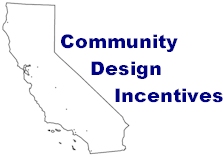 The Sacramento Area Council of Governments in
California has approved a $500 million program to financially
reward local governments for smart growth, more compact
development, transit-oriented development, and walkable and
livable communities. The move was a major victory for STPP
California, which had worked hard to generate support for the
measure by the six-county Metropolitan Planning Organization.
The program is based on a similar program run by the San
Francisco Bay Area’s Metropolitan Transportation Commission.
The total dedicated to this program is $600 million; $500
million regional funds off the top plus a $100 million match
by locals. Also, off the top are Bike/Ped projects at $300
million of regional funds, and $280 of local funds to match
regional projects. As part of the program, a pledge was made
by the board that half of the revenues generated by the next
sales tax will go towards transit. The Sacramento Area Council of Governments in
California has approved a $500 million program to financially
reward local governments for smart growth, more compact
development, transit-oriented development, and walkable and
livable communities. The move was a major victory for STPP
California, which had worked hard to generate support for the
measure by the six-county Metropolitan Planning Organization.
The program is based on a similar program run by the San
Francisco Bay Area’s Metropolitan Transportation Commission.
The total dedicated to this program is $600 million; $500
million regional funds off the top plus a $100 million match
by locals. Also, off the top are Bike/Ped projects at $300
million of regional funds, and $280 of local funds to match
regional projects. As part of the program, a pledge was made
by the board that half of the revenues generated by the next
sales tax will go towards transit.
| |
|
| |
Quote of
the Week |
| |
“Show us someone who’d argue that Manhattan needs
more car traffic, and we’ll show you a parking-garage
owner.”
– Newsday, on the decision to lift
the carpool rules on the Queensboro Bridge, the Queens Midtown
Tunnel and the Lincoln Tunnel that were put in place following
the events of September 11. For more information, click
here
|
| |
Calendar |
| |
National Walk to Lunch Day
May
1, 2002
House T&I Schedule
May 1,
2002: Highways and Transit: Hearing on Major Project
Management
Senate EPW Hearings
Date
TBA: Operations and Security in Metropolitan Areas
Date TBA: Rescheduled hearing, full committee
business meeting
Transportation and University Communities
Conference
June 15-18, 2002: Amherst,
MA
BikeFest 2002
August 2-4, 2002;
Amherst, MA
Pro Bike / Pro Walk
2002
September 3-6, 2002; St. Paul,
MN
|
| |
In
Brief |
| |
MBTA Announces Switch to Cleaner Diesel
The Massachusetts Bay Transportation Authority (MBTA) has
announced a $3 million plan to convert 980 diesel buses to
cleaner burning low-sulphur diesel fuel. For a Boston Globe
article on the switch, click
here. For MBTA's press release, click
here.
Amtrak Names New Head
Amtrak announced last week that David L. Gunn, who once
headed the transit systems in New York City and Washington,
will replace outgoing president George Warrington on May 15.
To read more, click
here.
Internship Opportunity at STPP
This position will conduct strategic research and
grassroots organizing to support the organization of the
Alliance for a New Transportation Charter. Activities will
generally consist of gathering information to support STPP's
model campaigns, assisting with outreach to add members to the
Alliance and support for our grassroots network in conducting
activities such as candidate education. See a complete job
description at http://www.transact.org/.
| |

 Highway interests often back up their calls for
more road-building by citing the statistic that roadway
capacity in the U.S. has grown by just 2 percent in the last
ten years. A new edition of STPP’s “Decoding Transportation
Policy & Practice” explains why that figure greatly
misrepresents the capacity of our nation's surface
transportation infrastructure.
Highway interests often back up their calls for
more road-building by citing the statistic that roadway
capacity in the U.S. has grown by just 2 percent in the last
ten years. A new edition of STPP’s “Decoding Transportation
Policy & Practice” explains why that figure greatly
misrepresents the capacity of our nation's surface
transportation infrastructure.
 TEA-21's guaranteed funding levels for public
transit investments have provided a significant increase in
economic and social benefits, according to transit leaders who
testified before the House Subcommittee on Highways and
Transit subcommittee today.
TEA-21's guaranteed funding levels for public
transit investments have provided a significant increase in
economic and social benefits, according to transit leaders who
testified before the House Subcommittee on Highways and
Transit subcommittee today. The Senate Committee on Commerce, Science, and
Transportation voted 20-3 in favor of the National Defense
Interstate Rail Act (S. 1991) on April 18, 2002. The bill,
authored by the Committee Chair Fritz Hollings (SC) and other
Senate leaders, calls for a broader federal commitment to
developing interstate rail infrastructure, focusing on
high-speed rail corridors, increased funding and fiscal
accountability for Amtrak, and new security requirements for
rail lines and stations. To read more about this bill,
The Senate Committee on Commerce, Science, and
Transportation voted 20-3 in favor of the National Defense
Interstate Rail Act (S. 1991) on April 18, 2002. The bill,
authored by the Committee Chair Fritz Hollings (SC) and other
Senate leaders, calls for a broader federal commitment to
developing interstate rail infrastructure, focusing on
high-speed rail corridors, increased funding and fiscal
accountability for Amtrak, and new security requirements for
rail lines and stations. To read more about this bill,  The House Committee on Transportation
and Infrastructure approved an airport ‘streamlining’ bill, HR
4481, last week that would threatens the environmental review
process for airport siting and infrastructure projects. The
aviation streamlining bill is viewed as part of a concerted
progression of attacks on existing federal environmental
statutes. Proponents of aviation and other environmental
streamlining efforts argue that existing environmental review
and regulations are hindering transportation and other
improvement projects. Environmental and other groups opposed
the pending aviation bill, which was somewhat modified in the
full committee, expressing concerns that the issues
surrounding large, complicated and controversial projects are
not simply explained by attacks on the underlying federal
environmental statutes. In addition, streamlining efforts in
aviation and in other areas are expected to undermine state
and local efforts to participate in projects that directly
affect them and that some proposed “reforms” could have
disastrous environmental repercussions. For more information,
The House Committee on Transportation
and Infrastructure approved an airport ‘streamlining’ bill, HR
4481, last week that would threatens the environmental review
process for airport siting and infrastructure projects. The
aviation streamlining bill is viewed as part of a concerted
progression of attacks on existing federal environmental
statutes. Proponents of aviation and other environmental
streamlining efforts argue that existing environmental review
and regulations are hindering transportation and other
improvement projects. Environmental and other groups opposed
the pending aviation bill, which was somewhat modified in the
full committee, expressing concerns that the issues
surrounding large, complicated and controversial projects are
not simply explained by attacks on the underlying federal
environmental statutes. In addition, streamlining efforts in
aviation and in other areas are expected to undermine state
and local efforts to participate in projects that directly
affect them and that some proposed “reforms” could have
disastrous environmental repercussions. For more information,
 Newly released statistics from the National Highway
Traffic Safety Administration (NHTSA) show a slight decline in
the number of traffic fatalities and injuries from 2000 to
2001. Injuries from crashes fell 5 percent from 3.2 million in
2000 to 3.0 million in 2001. A total of 41,730 people were
killed in crashes last year, a drop of two-tenths of one
percent from the 41,821 persons killed in 2000. "Losing nearly
42,000 of our friends, neighbors and family members to highway
crashes is unacceptable," said U.S. Transportation Secretary
Norman Y. Mineta in response to the new statistics. Since
1990, more than 450,000 Americans have died in crashes.
Newly released statistics from the National Highway
Traffic Safety Administration (NHTSA) show a slight decline in
the number of traffic fatalities and injuries from 2000 to
2001. Injuries from crashes fell 5 percent from 3.2 million in
2000 to 3.0 million in 2001. A total of 41,730 people were
killed in crashes last year, a drop of two-tenths of one
percent from the 41,821 persons killed in 2000. "Losing nearly
42,000 of our friends, neighbors and family members to highway
crashes is unacceptable," said U.S. Transportation Secretary
Norman Y. Mineta in response to the new statistics. Since
1990, more than 450,000 Americans have died in crashes.
 Figures from FHWA and the American Public Transit
Association released April 17, 2002 show that for the first
time ever, the growth in transit ridership has exceeded the
growth in driving for five years in a row. From 2000 to 2001,
transit ridership increased by 2 percent, with driving growing
by only 1 percent during the same period.
Figures from FHWA and the American Public Transit
Association released April 17, 2002 show that for the first
time ever, the growth in transit ridership has exceeded the
growth in driving for five years in a row. From 2000 to 2001,
transit ridership increased by 2 percent, with driving growing
by only 1 percent during the same period.
 The Sacramento Area Council of Governments in
California has approved a $500 million program to financially
reward local governments for smart growth, more compact
development, transit-oriented development, and walkable and
livable communities. The move was a major victory for STPP
California, which had worked hard to generate support for the
measure by the six-county Metropolitan Planning Organization.
The program is based on a similar program run by the San
Francisco Bay Area’s Metropolitan Transportation Commission.
The total dedicated to this program is $600 million; $500
million regional funds off the top plus a $100 million match
by locals. Also, off the top are Bike/Ped projects at $300
million of regional funds, and $280 of local funds to match
regional projects. As part of the program, a pledge was made
by the board that half of the revenues generated by the next
sales tax will go towards transit.
The Sacramento Area Council of Governments in
California has approved a $500 million program to financially
reward local governments for smart growth, more compact
development, transit-oriented development, and walkable and
livable communities. The move was a major victory for STPP
California, which had worked hard to generate support for the
measure by the six-county Metropolitan Planning Organization.
The program is based on a similar program run by the San
Francisco Bay Area’s Metropolitan Transportation Commission.
The total dedicated to this program is $600 million; $500
million regional funds off the top plus a $100 million match
by locals. Also, off the top are Bike/Ped projects at $300
million of regional funds, and $280 of local funds to match
regional projects. As part of the program, a pledge was made
by the board that half of the revenues generated by the next
sales tax will go towards transit.